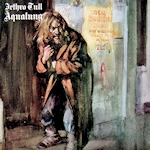
"Aqualung" is the fourth studio album by British progressive rock band Jethro Tull, released March 19, 1971. It is widely regarded as one of the band's best and most influential works, and is considered a classic of the progressive rock genre.
The album was produced by Ian Anderson, the band's frontman and primary songwriter, and features a conceptually linked series of songs exploring themes of religion, poverty, social inequality, and the nature of human existence. The title track, "Aqualung," tells the story of a homeless man, while other songs like "My God," "Cross-Eyed Mary," and "Wind-Up" tackle issues of organized religion, prostitution, and societal expectations.
Musically, the album is characterized by Anderson's distinctive flute playing, Martin Barre's guitar work, and the band's use of complex time signatures, orchestration, and folk elements. The album also features bassist Jeffrey Hammond, drummer Clive Bunker, keyboardist John Evan and orchestral arranger Dee Palmer.
Track by track (vinyl):
- Aqualung:
- Overview: The title track introduces the character Aqualung, a homeless man, and paints a vivid picture of the struggles of urban life. The song is known for its iconic riff and dynamic shifts, showcasing the band's progressive rock tendencies.
- Analysis: The lyrics explore themes of urban alienation, poverty, and the indifference of society. The contrasting sections, from heavy guitar riffs to delicate acoustic passages, highlight Jethro Tull's ability to blend different musical elements seamlessly.
- Cross-Eyed Mary:
- Overview: This song continues the theme of urban life, focusing on a young girl named Mary and her experiences in the city. Musically, it features catchy melodies and a memorable flute riff.
- Analysis: The lyrics delve into societal expectations and the exploitation of youth. The flute work by Ian Anderson is particularly noteworthy, adding a folk-influenced element to the rock sound.
- Cheap Day Return:
- Overview: A short acoustic piece, serving as an interlude. Clocking in at just over a minute, it provides a breather between the more intense tracks.
- Analysis: The simplicity of the acoustic guitar and Anderson's vocals create a poignant moment, offering a contrast to the larger-than-life sound of the surrounding tracks.
- Mother Goose:
- Overview: This whimsical track combines folk elements with progressive rock. It features playful lyrics and showcases the band's versatility.
- Analysis: "Mother Goose" provides a lighter, more fantastical element to the album. The use of flute and acoustic guitar contributes to the song's whimsical atmosphere.
- Wond'ring Aloud:
- Overview: Another acoustic interlude, featuring gentle guitar and poetic lyrics.
- Analysis: The lyrics explore themes of love and contemplation. The simplicity of the arrangement allows Anderson's vocals and the intimate nature of the lyrics to take center stage.
- Up to Me:
- Overview: A more upbeat track, featuring a mix of acoustic and electric instrumentation. It addresses personal relationships and responsibility.
- Analysis: The song has a lively energy, and the interplay between the acoustic guitar and electric elements contributes to its dynamic sound. The lyrics touch on personal growth and the choices we make.
- My God:
- Overview: One of the more complex and progressive tracks on the album, both musically and lyrically. It engages with themes of religion and spirituality.
- Analysis: "My God" features intricate instrumental sections, showcasing the band's technical prowess. Lyrically, it challenges organized religion and questions the nature of faith.
- Hymn 43:
- Overview: A more straightforward rock track with a catchy riff and direct lyrics.
- Analysis: "Hymn 43" offers a critique of organized religion, and its upbeat tempo contrasts with the heavier themes explored in the lyrics.
- Slipstream:
- Overview: An instrumental piece that features the flute prominently, creating a dreamy and atmospheric quality.
- Analysis: "Slipstream" provides a sonic departure from the more vocal-driven tracks, showcasing the band's instrumental versatility.
- Locomotive Breath:
- Overview: One of the most well-known tracks on the album, "Locomotive Breath" is a driving, energetic piece with a memorable riff and powerful vocals.
- Analysis: The lyrics depict a sense of urgency and chaos, and the music mirrors this with its propulsive rhythm. The flute and guitar work add layers of complexity to the overall sound.
- Wind-Up:
- Overview: The closing track of the album, "Wind-Up" revisits and concludes some of the thematic elements introduced earlier in the album.
- Analysis: The song is a fitting end to the album, featuring a combination of acoustic and electric elements. Lyrically, it addresses the nature of existence and the human experience.
In summary, "Aqualung" is a diverse and thematically rich album, showcasing Jethro Tull's ability to seamlessly blend rock, folk, and progressive elements. The album's exploration of societal issues, combined with its musical innovation, has contributed to its lasting influence in the world of progressive rock.
Upon its release, "Aqualung" was a commercial and critical success, reaching the top ten in both the UK and the US. It has since been certified platinum in both countries, and has been praised for its innovative sound, thought-provoking lyrics, and enduring influence on the progressive rock genre.
Jethro Tull genealogy and discographyExplore Jethro Tull music on Amazon...
